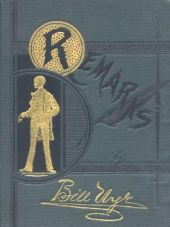Remarks
by Bill Nye

Plato was a Greek philosopher who flourished about 426 B.C., and kept on flourishing for eighty-one years after that, when he suddenly ceased do so. He early took to poetry, but when he found that his poems were rejected by the Greek papers, he ceased writing poetry and went into the philosophy business. At that time Greece had no regular philosopher, and so Plato soon got all he could do.
Plato was a pupil of Socrates, who was himself no slouch of a philosopher. Many and many a day did Socrates take his little class of kindergarten philosophers up the shady banks of the Ilissus, and sit all day discoursing to his pupils on deep and difficult doctrines, while his unsandaled feet were bathed in the genial tide. Many happy hours were thus spent. Socrates would take his dinner or tell some wonderful tale to his class, whereby he would win their dinner himself. Then in the deep Athenian shade, with his bare, Gothic feet in the clear, calm waters of the Ilissus, he would eat the Grecian doughnut of his pupils, and while he spoke in poetic terms of his belief, he would dig his heel in the mud and heave a heart-broken sigh.
Such was Socrates, the great teacher. He got a small salary, and went barefoot till after Thanksgiving. He was a great tutor, and boarded around, teaching in the open air while the mosquitos bit his bare feet. No tutor ever tuted with a more unselfish purpose or a smaller salary.
Plato maintained, among other things, that evil is connected with matter, and aside from matter we do not find evil existing. That is true. At least, such evil as we might find apart from matter would be outside the jurisdiction of a police court. I think Plato was correct. Evil and matter are inseparable. That’s what’s the matter.
It is quite common for us to say that virtue is its own reward. Plato held that, while it was better to be virtuous as a matter of economy and ultimate peace than not to be virtuous at all, he believed in being virtuous for a higher reason. Probably it was notoriety. He would rather be right than be president. He believed in being good just for the excitement of it, and the notice it would attract, and not because it paid. Plato was a great virtuoso.
Socrates would have been called a crank if he had lived in our day and age, and if Plato were to go into London or New York and talk of organizing a society for the encouragement of virtue among adult male taxpayers he would have a lonesome time of it. Be virtuous and you will be happy was a favorite motto with Plato. The legend is still quoted by those who love to ransack the dead past.
Pluto was quite another party, and some get him mixed up with Plato. They were not related in any way, Pluto being a son of Saturn and Rhea, who flourished at about the same time as Plato. Pluto was a brother of Jupiter and Neptune, and when the estate of Saturn was wound up, Jupiter wanted the earth, and he got it. Neptune wanted the codfish conservatory and the mermaid’s home, so he took the deep, deep sea, and even yet he rides around in a gold spangled stone boat on the pale green billows of the summer sea, jabbing a pickerel ever and anon with a three pronged fork. He leads a gay life, going to picnics with the mermaids in their coral caves, or attending their full evening dress parties, clad in a trident and a fall beard. He loves the sea, the lone, blue sea, and those who have seen him turning handsprings on a sponge lawn, or riding in his water-tight chariot with his feet over the dash-board, beside a slim young mermaid with Paris green hair, and dressed in a tight-fitting, low-neck dorsal fin, say he is a lively old party.
But Pluto was different. He stood around till the estate was all closed up, and it looked as though he had got left. Just then the administrator says: “Why, here’s Pluto. He is going to come out of the little end of the horn. He will have to hustle for himself,” Pluto resented this and clinched with the administrator. They fought till each had a watch pocket on the brow and an Irish sunset symphony in green under the eye, while Jupiter and Neptune stood by and encouraged the fight. Jupiter rather took sides with his brother, and Neptune stood in with the administrator. In the midst of the confusion Jupiter speaks up and says: “Swat him under the ear, Pluto.” Whereupon Neptune says to the administrator. “Give him–hail.” The administrator paused and said that was a good suggestion. He would do so. And so he forgave Pluto and gave him–sheol.
 Continue...
Continue...![[Buy at Amazon]](http://images.amazon.com/images/P/B000875S1G.01.MZZZZZZZ.jpg)